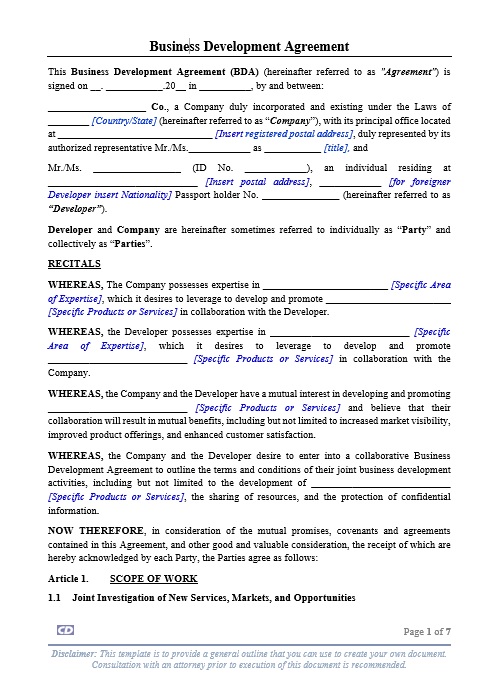Estimated reading time: 3 minutes
Business development goes far beyond sales; it functions as a comprehensive strategy that drives sustainable growth, enhances market position, and ensures long-term success. Therefore, companies that want to thrive must integrate strategic planning, market entry, product innovation, and collaborative partnerships into their approach. To structure these efforts and safeguard the interests of all stakeholders, a Business Development Agreement serves as an essential tool.

Advantages of Business Development
✔ Exploring New Market Opportunities
Organisations can drive growth by actively pursuing untapped customer groups, emerging industries, and promising regions where their products or services thrive. Furthermore, these efforts create fresh revenue streams and position businesses ahead of competitors.
✔ Enhancing Product and Service Portfolios
To remain competitive, companies must continuously refine and diversify their offerings. In addition, by responding to evolving consumer expectations, they strengthen loyalty and maintain long-term relevance.
✔ Expanding into New Territories
When businesses enter new geographical markets, they expand audience reach and boost revenue potential. Moreover, a well-structured agreement ensures this expansion unfolds with clarity, fairness, and reduced risk.
Core Components
✔ Scope of Work
The agreement clearly defines duties, activities, timelines, and deliverables for each party. As a result, well-structured responsibilities eliminate ambiguity and create accountability.
✔ Compensation and Incentives
Transparent financial arrangements build trust between parties. Therefore, the contract should specify payment schedules, performance-based rewards, and adjustment conditions to minimise disputes.
✔ Confidentiality Safeguards
Businesses must protect sensitive information at all stages. Consequently, the contract should describe what qualifies as confidential, outline protective measures, and set the duration of these obligations.
✔ Non-Compete Provisions
Parties can prevent conflicts of interest by restricting competing activities within a defined scope, territory, and timeframe. Thus, non-compete clauses secure the integrity of the partnership.
Building a Structured Partnership
A Business Development Agreement goes beyond serving as a legal instrument; rather, it forms the foundation of a structured and mutually beneficial collaboration. Moreover, by aligning goals, responsibilities, and protections, the agreement allows partners to actively combine their expertise and resources to achieve shared objectives. Consequently, these agreements turn opportunities into lasting growth and long-term resilience.
Check out more pages of our website for related content:
- Business Development and Consultancy Agreement
- Non-Compete and Confidentiality Agreement
- Non-Compete Agreement
- Business Plan
References
- OECD – “Strategic Business Partnerships and Collaboration Models“ – Explores cooperation frameworks, commercial development structures, and partnership arrangements that support business growth.
- Harvard Business Review – “How to Build Successful Business Partnerships“ – Discusses the principles behind partnership agreements, revenue development structures, and collaborative growth strategies.
- U.S. Small Business Administration (SBA) – “Strategic Alliances and Business Collaborations“ – Provides guidance on partnership mechanics, scope setting, compensation structures, and commercial development planning.
has been added to your cart!
have been added to your cart!



